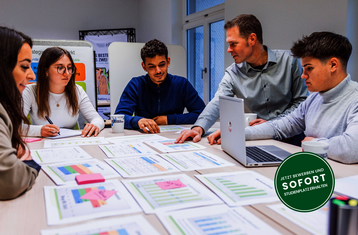
Exkursion zur Fakultät Wirtschaftsingenieurwesen
Schülerinnen und Schüler begeistert von Marketing- und Marktforschungsthemen

Neben diesen aktuellen Nachrichten können Sie sich auch in unseren HFU Newslettern darüber informieren, was an der Hochschule Furtwangen los ist: Link öffnet sich im gleichen Fenster:Zu unseren Newslettern.
Wenn wir Ihnen Bescheid geben dürfen, sobald ein neuer Newsletter erscheint, mailen Sie gerne an E-Mail Anwendung wird gestartet:presse(at)hfu.eu und melden Sie sich für den Newsletter an.
Im September 2023 wurde die Hochschule Furtwangen Ziel eines Cyberangriffs. Hier finden Sie Link öffnet sich im gleichen Fenster:datenschutzrechtliche Informationen rund um den Cyberangriff.

Schülerinnen und Schüler begeistert von Marketing- und Marktforschungsthemen

Praxisprojekt: Studierende analysieren und optimieren Software für SICK

Sichere Dir jetzt Deinen Studienplatz bei Wirtschaftsingenieurwesen

„Ich möchte hier studieren!“

Erste HFU Summer School startet am 25. Juli!

Beim "Rector’s Flying Summer Dinner" stellte das IDACUS-Institut der Hochschule Furtwangen aktuelle Fortschritte im KI-Bereich vor und suchte den Austausch mit regionalen Unternehmen.

Manav Madan erhält Best-Student-Paper-Award bei der 25th International Conference on Engineering Applications of Neural Networks

„THE BLÄNDED learning“ soll von der Hochschule Furtwangen aus dem Fachkräftemangel entgegenwirken

Innovatives Informatik-Projekt gewinnt Semesterpreis

Feierlicher Graduiertenabschied an der HFU Business School
Jetzt Studiengang aussuchen und per Schnellzulassung an der HFU durchstarten!

Neue Erkenntnisse über die seltene Muskelerkrankung FSHD
Veröffentlicht von
Gib' uns Dein Feedback
© Hochschule Furtwangen